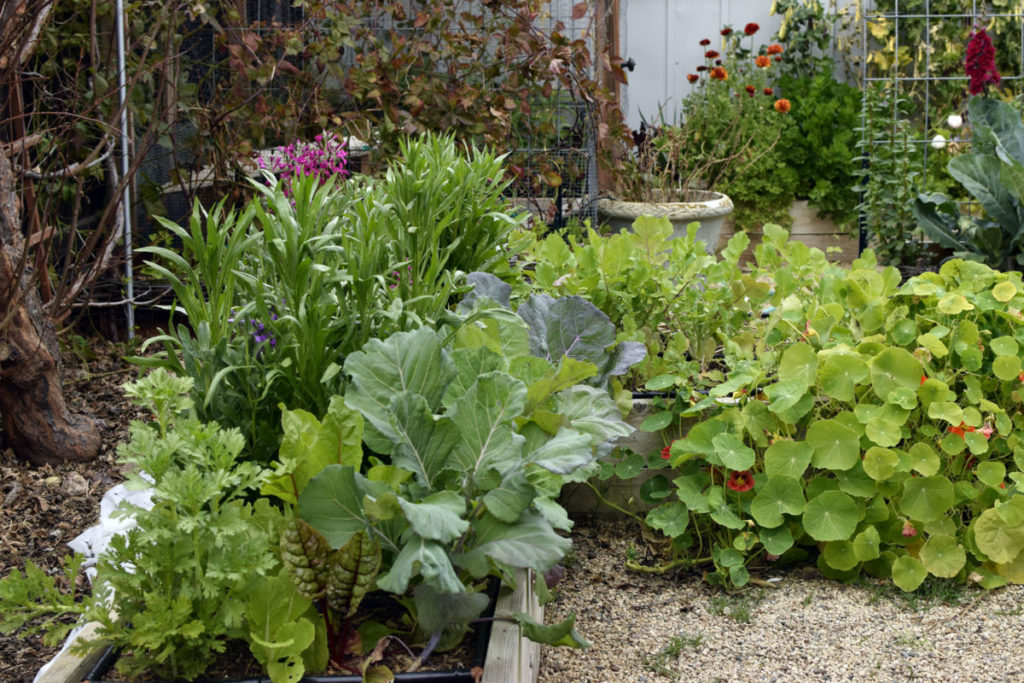As an off-gridder, self-sufficiency is key.
One of the most important aspects of independent living is cultivating your own medicine cabinet.
Instead of relying on store-bought pharmaceuticals, consider incorporating these top herbs into your off-grid lifestyle.
From calming nerves to fighting infections, these botanical wonders will help you maintain a healthy and thriving life without the need for commercial medications.
By learning about their unique properties and uses, you’ll be well on your way to becoming more self-sufficient and prepared for any situation that comes your way.
So, let’s dive in and explore the top herbs every off-gridders should know!
Lemongrass
A versatile herb used for cooking, cleaning, and medicinal purposes. Its citrusy scent repels mosquitoes and other pests.
Not only does it add flavor and depth to your cooking, but its powerful scent also repels mosquitoes and other pests, creating a naturally bug-free environment.
Use it in teas, sauces, and marinades, or incorporate it into your cleaning solutions to give your home a fresh and citrusy scent.
Lemongrass has been used in traditional medicine for centuries, offering a range of health benefits from reducing inflammation and fever to improving digestion and boosting the immune system.
Whether you’re looking to add some flavor, repel pests, or improve your health, lemongrass is a versatile herb that can do it all.
Chives
A hardy, perennial herb used for seasoning and garnishing dishes. Chives can be used in place of garlic or onion for added flavor and nutrition.
Chives are a versatile and hardy perennial herb that can be used to add flavor and nutrition to a variety of dishes.
With a mild onion or garlic taste, chives can be used as a substitute for these pungent ingredients, making them a great option for those looking to reduce their sodium intake or for those who are allergic to garlic or onions.
Chives are also rich in vitamins and minerals, such as vitamin A and potassium, and are a good source of dietary fiber.
Chives are low in calories and fat, making them a great addition to weight loss diets.
Whether you use them to season soups, salads, or meat dishes, chives are a versatile and nutritious addition to any meal.
Mint
A refreshing herb used for cooking, drinks, and medicinal purposes. Mint can be used to soothe stomachaches and reduce nausea.
Mint is a versatile and refreshing herb that can be used for a variety of purposes, from cooking and drinks to medicinal applications.
One of its most well-known uses is to soothe stomachaches and reduce nausea.
The active compound in mint, menthol, has natural antispasmodic properties, which can help to calm the digestive system and alleviate discomfort.
Mint’s cooling and decongesting properties make it a popular ingredient in drinks and desserts, such as mint tea, smoothies, and ice cream.
When consumed as a tea or in supplement form, mint can also provide relief from headaches, indigestion, and respiratory issues.
Whether you’re looking to add a burst of fresh flavor to your meals or seeking natural remedies for common ailments, mint is an excellent herb to have on hand.
Rosemary
A fragrant, evergreen herb used for seasoning, preserving, and medicinal purposes. Rosemary can help improve memory, reduce inflammation, and boost immunity.
Rosemary is a fragrant, evergreen herb that has been utilized for centuries for its multifaceted purposes.
Not only does it enhance the flavor of various dishes, but it also possesses a plethora of health benefits.
One of its most significant advantages is its ability to improve memory and cognitive function.
Studies have shown that rosemary oil can increase blood flow to the brain, which can help to improve memory and concentration.
Rosemary contains antioxidants that can help to reduce inflammation and protect against age-related cognitive decline.
Moreover, rosemary has antimicrobial and antiviral properties, which make it an effective natural remedy for various infections and diseases.
It has been traditionally used to treat respiratory issues such as bronchitis and asthma, as well as to boost the immune system.
Rosemary essential oil can also be applied topically to treat skin infections, wounds, and insect bites.
Rosemary is an excellent source of vitamin B6, iron, and calcium, which are essential for maintaining a healthy nervous system and preventing conditions such as anemia and osteoporosis.
Overall, rosemary is a versatile and powerful herb that can be utilized in various aspects of our lives, from cooking and medicine to personal care and wellness.
Thyme
A low-growing, spreading herb used for seasoning, preserving, and medicinal purposes. Thyme has antiseptic properties and can be used to treat respiratory issues.
Thyme is a versatile and highly useful herb that can be employed in various ways to improve your health and wellbeing.
As a low-growing, spreading plant, thyme is perfect for cultivation in containers or as a ground cover in gardens.
Its delicate, fragrant leaves can be used fresh or dried to add depth and warmth to a wide range of dishes, from soups and stews to meat and vegetable dishes.
In addition to its culinary uses, thyme has a long history of medicinal application, dating back to ancient Egypt and Greece.
The herb contains antiseptic properties that can help to combat respiratory issues such as bronchitis, coughs, and colds.
Thyme can also be used to soothe sore throats and alleviate symptoms of allergies and flu.
To use thyme medicinally, you can make a tea by steeping fresh or dried leaves in boiling water, or add dried thyme to a warm bath for relaxation and decongestion.
Thyme is also a popular ingredient in natural skincare products, as its antiseptic and antioxidant properties can help to soothe and protect the skin.
Overall, thyme is a versatile and powerful herb that can be used in a variety of ways to improve your health and wellbeing.
Sage
A hardy, perennial herb used for seasoning, preserving, and medicinal purposes. Sage can improve cognitive function, reduce inflammation, and boost immunity.
Sage is a hardy, perennial herb that has been used for centuries not only as a seasoning agent in cooking, but also for its medicinal and preservative properties.
This herb contains a variety of bioactive compounds, including volatile oils, flavonoids, and carotenoids, which are responsible for its numerous health benefits.
Studies have shown that sage can improve cognitive function by enhancing memory and attention, as well as reducing inflammation and boosting immunity.
The herb’s antioxidant and anti-inflammatory properties make it an effective natural remedy for a range of conditions, from minor wounds to more serious health issues such as Alzheimer’s disease and arthritis.
Sage contains rosmarinic acid, a compound that has been shown to have anti-cancer properties.
Whether you’re looking to add some flavor to your next meal or seeking a natural way to boost your health, sage is a versatile and effective herb that is well worth considering.
Oregano
A pungent, perennial herb used for seasoning, preserving, and medicinal purposes. Oregano has antibacterial and antifungal properties, making it a great addition to natural cleaning products.
Oregano is a pungent, perennial herb that not only adds flavor to dishes, but also has a range of medicinal and practical uses.
The herb’s antibacterial and antifungal properties make it an excellent addition to natural cleaning products.
When added to cleaning solutions, oregano can help to disinfect surfaces and eliminate harmful bacteria and fungi.
This is especially useful for cleaning food preparation areas and surfaces, as well as for sanitizing household surfaces that are prone to germ buildup.
Moreover, the antibacterial properties of oregano can also help to reduce the risk of infections and illnesses in the home.
Oregano is a natural preservative, which can help to extend the shelf life of cleaning products and reduce the need for harsh chemicals.
Overall, incorporating oregano into your natural cleaning routine can provide a healthy, effective, and eco-friendly way to keep your home clean and free of harmful bacteria and fungi.
Basil
A sweet, fragrant herb used for seasoning and medicinal purposes. Basil has anti-inflammatory properties and can be used to treat digestive issues and reduce stress.
Basil, that sweet and fragrant herb, is a powerhouse of health benefits, offering anti-inflammatory properties and a wealth of medicinal uses.
Whether you’re looking to season your next meal or seeking relief from digestive issues and stress, basil is the perfect addition to your arsenal of natural remedies.
First and foremost, basil’s anti-inflammatory properties make it an ideal solution for soothing stomachaches, cramps, and other digestive issues.
Whether you’re experiencing bloating, gas, or abdominal pain, the anti-inflammatory compounds found in basil can help reduce inflammation and promote healing.
Basil contains antioxidants that can help protect your body from damage caused by free radicals.
But basil’s benefits don’t stop there.
This herb is also a natural stress-reliever, offering a calming effect on the mind and body.
Incorporating basil into your diet can help reduce anxiety, promote relaxation, and improve your overall mood.
And if you’re looking for a natural sleep aid, basil can help with that too!
Its sedative properties can promote a restful night’s sleep, leaving you feeling refreshed and rejuvenated.
So why not give basil a try?
Adding it to your meals or making it into a tea can be a delicious and effective way to incorporate its health benefits into your daily routine.
Whether you’re looking to soothe your stomach, reduce stress, or improve your sleep, basil is a natural and tasty solution.
Want More? Dive Deeper Here!
Hey there! If you’re the type who loves going down the rabbit hole of information (like we do), you’re in the right spot. We’ve pulled together some cool reads and resources that dive a bit deeper into the stuff we chat about on our site. Whether you’re just killing time or super into the topic, these picks might just be what you’re looking for. Happy reading!






